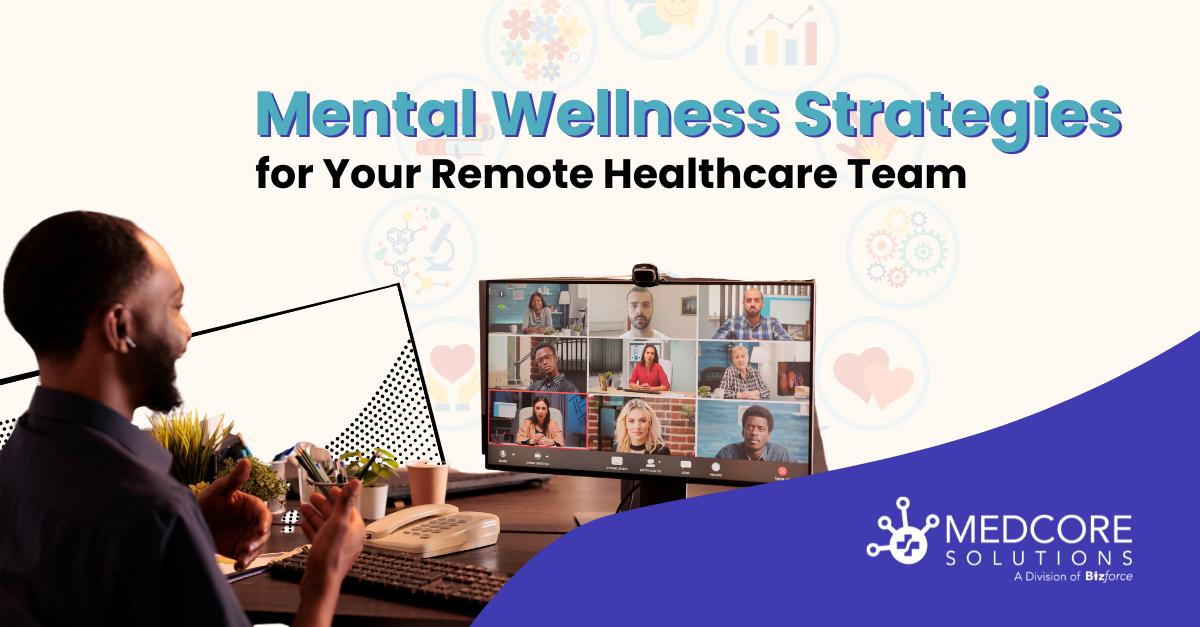Interest in in-office work dropped by 24%, according to the State of Remote Work 2022 report by Owl Labs. With A-Players considering working from home full-time, remote work becomes increasingly common in big industries including healthcare. However, organizations face a new challenge: supporting the mental wellness of their remote teams. While remote work offers flexibility, reduced commuting time, and a better work-life balance, it can also lead to feelings of isolation, burnout, and disengagement if not properly managed. For healthcare professionals who already deal with difficult patients, maintaining mental wellness while working remotely is crucial for both their well-being and the quality of care they provide. This blog explores mental wellness strategies for remote healthcare teams that healthcare organizations can implement to ensure their remote teams stay motivated, productive, and mentally healthy.
7 Key Strategies for Your Remote Healthcare Team’s Mental Wellness

-
Foster Open and Supportive Communication
Communication is the cornerstone of any successful remote team. Therefore, it’s particularly important when considering the mental wellness of your employees. Without regular face-to-face interaction, it’s easy for remote workers to feel disconnected from their colleagues and the broader organizational culture.
Create regular check-ins
Daily or weekly one-on-one meetings between managers and team members can provide a space to discuss not only work-related issues but also personal well-being. These check-ins allow employees to express any concerns they might have. You will have the chance to resolve potential stressors before they escalate.
Foster a culture of openness
Encourage team members to talk openly about mental health and well-being. This can be done through internal communication platforms and virtual team-building activities. You can also create wellness workshops that address topics like stress management or burnout prevention.
At MedCore, our remote healthcare staff experience the benefits of a supportive approach through regular communication and engagement activities. We host weekly to quarterly virtual celebrations to engage with our remote teams. These celebrations not only provide a platform for appreciation but also include fun games and interactive activities to engage everyone, fostering a sense of connection and belonging. This focus on mental wellness and team bonding ensures that our healthcare professionals feel valued. They feel motivated and ready to deliver top-tier care, no matter where they are.
-
Set Clear Expectations and Boundaries
One of the most common sources of stress for remote healthcare workers is the lack of clear boundaries between work and personal life. When working from home can tempt employees to work longer hours or be constantly available. This may lead to burnout and decreased mental wellness.
Define work hours
Ensure that remote healthcare workers have clearly defined working hours and are not expected to respond to emails or tasks outside of these times. Setting these boundaries allows employees to fully disengage after their shift and recharge.
Encourage breaks
A simple reminder to stand up, stretch, or take a short walk can make a significant difference in reducing stress. What’s more, this improves focus. Therefore, consider setting up break reminders using communication tools or apps that nudge employees to take brief timeouts.
-
Prioritize Mental Health Resources
Offering mental health support and resources is a proactive approach to ensuring the well-being of remote healthcare workers. Employees need to know that help is available when they need it, whether they are struggling with work-related stress or personal challenges.
Organize webinars or training sessions on mental wellness topics. These topics can be stress management, mindfulness, and work-life balance. Providing education on mental health not only helps employees manage their own well-being but also fosters a culture where mental health is prioritized and supported.
-
Promote Social Connection
A major challenge of remote work is the absence of social interaction. For healthcare professionals, who are often used to working in team-based, fast-paced environments, the sudden shift to remote work can feel isolating. Social connection is essential for mental wellness. It helps reduce feelings of loneliness and strengthens the sense of belonging within the team.
Host virtual team-building activities
Schedule regular virtual meetups, coffee breaks, or game nights where the team can interact in a non-work setting. These events create opportunities for social bonding and help remote healthcare workers feel more connected to their colleagues.
Encourage peer support groups
Set up internal peer support groups where team members can share experiences, provide encouragement, and offer practical advice. For example, nurses working remotely in telehealth may find value in discussing their challenges with colleagues who are in similar roles.
-
Cultivate a Flexible Work Environment
A key benefit of remote work is the flexibility it provides. However, flexibility should extend beyond just working from home. For healthcare professionals, who may have unpredictable schedules or additional caregiving responsibilities, providing a flexible work environment is key to reducing stress and supporting mental wellness.
Offer flexible scheduling
Allow team members to work during the hours that best suit their personal lives, as long as their core responsibilities are met. This flexibility can alleviate the stress of juggling work and personal responsibilities, especially for those caring for children or elderly family members.
Emphasize results over hours
Focus on outcomes and results rather than the number of hours worked. This approach encourages employees to manage their time efficiently while reducing the pressure to be constantly “on” during traditional working hours.
-
Recognize and Celebrate Achievements
Remote workers, particularly those in the healthcare field, may feel that their hard work goes unnoticed without the in-person recognition that typically happens in an office or hospital setting. A lack of acknowledgment can contribute to feelings of disengagement and diminished morale, both of which negatively impact mental wellness.
Celebrate wins, big and small
Whether it’s recognizing an employee for handling a difficult case or reaching a team milestone, take the time to celebrate achievements. Public acknowledgment in team meetings or shout-outs on internal communication platforms can go a long way in boosting morale.
Provide meaningful rewards
Consider offering rewards for outstanding performance, such as additional time off, wellness packages, or gift cards. Meaningful recognition makes employees feel valued and appreciated for their efforts.
-
Encourage Physical Wellness to Support Mental Health

Mental and physical health are closely connected. Encouraging your remote healthcare team to stay physically active and maintain healthy habits can significantly improve their mental well-being.
Promote movement throughout the day
Encourage team members to incorporate movement into their daily routines. This could be in the form of short exercise breaks, walking meetings, or standing desks. Consider organizing virtual fitness challenges to engage the team and promote healthy competition.
Offer wellness incentives
Provide incentives for physical wellness, such as subsidies for gym memberships, online fitness classes, or wellness apps like Calm or Headspace. By supporting physical health, you can help improve the overall mental well-being of your remote team.
Conclusion
Supporting the mental wellness of your remote healthcare team is not just a short-term fix. It’s an investment in the long-term success and sustainability of your workforce. By fostering open communication, promoting flexibility, and providing mental health resources, you can create an environment where your team feels supported, motivated, and engaged. When mental wellness is prioritized, remote healthcare professionals are better equipped to deliver high-quality care. It maintains productivity and leads them to continue thriving in their roles.
By implementing these strategies, healthcare organizations can ensure that their remote teams not only succeed professionally but also maintain a sense of well-being and balance in their personal lives.
Supporting Your Remote Healthcare Team’s Mental Wellness for Long-Term Success with MedCore Solutions
As a leading provider of remote healthcare staff, MedCore Solutions understands the importance of mental wellness in fostering productivity and delivering exceptional patient care. Our dedicated remote healthcare professionals are supported with the tools and resources they need to stay engaged, healthy, and motivated. By partnering with MedCore, you’re not just filling roles—you’re building a high-performing team ready to provide excellent care. Contact us now to explore how MedCore can meet your staffing needs and help your team thrive!

